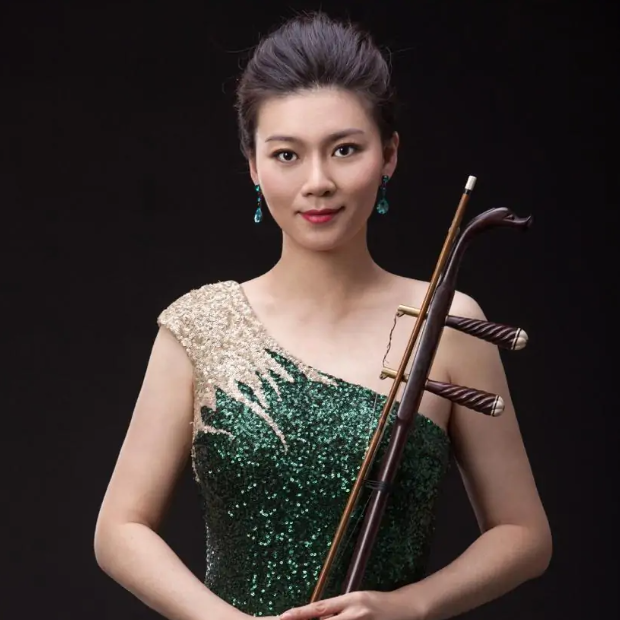Ma Xianghua

Ma Xianghua, born in Jinan, Shandong Province in 1975, is a Chinese erhu player.
In 1982, at the age of 7, he began to learn erhu with Chen Jianxin from the Jinan Children's Palace.
In 1984, at the age of 9, he studied with Su Anguo of Jinan Avant-garde Song and Dance Troupe.
In 1986, as a member of the Jinan Children's Visiting Group, he went to the UK for a 28-day visiting performance; in the same year, he was admitted to the Primary School Attached to the Central Conservatory of Music, and studied under Feng Zhihao and Nie Jingyu.
In June 1989, he won the first prize of the Erhu Junior Professional Group in the ART Cup China Musical Instrument International Competition.
In 1991, he began to study under the erhu player Liu Changfu.
In 1992, he went to Hong Kong, Taiwan, Singapore and Malaysia to visit and perform.
In June 1993, the group went to France, Belgium, the Netherlands, Denmark and Sweden to participate in international art festivals.
In January 1994, he went to the United States to perform cultural exchange with the Sino-American International Youth Music Hall Performance Troupe; in July, he visited Japan to participate in the "Summer of Tokyo" International Music Festival and performed with the Tokyo Symphony Orchestra.
In July 1995, he visited Australia with the Chinese performance group organized by the Chinese National Culture Promotion Association, and cooperated with the Australian Youth Symphony Orchestra at the Sydney Opera House. In 1996, he followed the Chinese National Culture Promotion Association to visit Thailand and performed with the Shanghai Symphony Orchestra at the Bangkok Cultural Center.
In April 1997, he held a recital in Hong Kong; in September, he held a recital in Beijing; in the same year, he won the first prize in the Erhu category of the China Instrumental Music Grand Prix in Taipei.
In 1998, he was admitted to the Central Conservatory of Music to study for a master's degree without examination; in December, he held the "Ma Xianghua Erhu Solo Concert" in Taiwan; in the same year, he released the album "Ma Xianghua Erhu Solo Album".
In February 1999, two "Ma Xianghua Erhu Solo Concerts" were held in Japan; on June 25, the "Ma Xianghua Erhu Solo Concert" was held in Beijing; on July 3, he participated in the performance by the Shanghai Symphony Orchestra in Shanghai. In the same year, the composer Huang Anlun's Erhu Concerto "Four Pieces of Dunhuang Ancient Scores" was premiered at the Beijing Concert Hall and the Radio Symphony Orchestra.
On March 21, 2000, "Liu Changfu and Ma Xianghua Huqin Concert" was held in Hong Kong; on May 20, he participated in the "Charm of Chinese Chamber Music" held by Hong Kong; on September 22, he participated in the concert held by Hong Kong ; In November, a total of two "Ma Xianghua Erhu Concerts" were held in Canada.
In April 2001, a total of two "Century Retrospective Erhu Centennial Concerts" were held in Beijing; on May 19, "Ma Xianghua Erhu Recital" and Graduate Graduation Concert was held in Beijing; Master's degree.
In 2002, the composer Chen Qigang's Erhu Concerto "Gone Time" premiered at the Beijing International Music Festival with the China Philharmonic Orchestra, and performed with the Hawaii Symphony Orchestra. Co-performed composer Tan Dun's Huqin Concerto "Crouching Tiger, Hidden Dragon".
In 2003, he released the album "Erhu and other bowed string music - introduction and maneuver".
In June 2009, a personal teacher-student concert was held in the Concert Hall of the Central Conservatory of Music.
In 2013, he served as the director of the Folk Music Department of the Middle School Attached to the Central Conservatory of Music.
In August 2017, the national tour of "Ma Xianghua Teacher and Student Concert" was held in Beijing, Changsha, Wuhan and other places.
In 2019, with the "Guofeng" group of the Central Conservatory of Music, he performed in the concert hall of the Zunyi Grand Theater - a special concert for erhu players of "The Power of Chinese Music".
Ma Xianghua performed Liu Tianhua's "Singing in the Sick" and Hua Yanjun's "Cold Spring Wind", which grasped the performance style of traditional music, and expressed the composer's emotions in the music delicately and passionately. Of particular note is her interpretation of Sun Wenming's two pieces of music, "People Are Quiet and Peaceful" and "The Sound of Xiao Jing at Night". Sun Wenming is an erhu artist with innovative spirit. The two pieces of music have very novel creations in performance skills, and the musical conception is also very ingenious. Ma Xianghua not only completed his performance skills well, but also was quite accurate in grasping Sun Wenming's musical style, and also had his own opinions on the processing and interpretation of music.
In addition, she has recorded more than ten solo albums, including a variety of styles and a large number of difficult erhu songs. With his outstanding performance, Ma Xianghua is often designated as a collaborator by composers, including in 1999 with the Radio Symphony Orchestra, the premiere of composer Huang Anlun's Erhu Concerto "Four Pieces of Dunhuang Ancient Scores"; the premiere in Tokyo in 2002. Composer Ishii Maki's erhu work "A Dream in the World III"; in the same year at the Beijing International Music Festival, he collaborated with the China Philharmonic Symphony Orchestra to premiere composer Chen Qigang's erhu concerto "Gone Time".
Similar artist
Involving musical instruments
Involved portfolio
Involved news
Popular artists
- 01 Zhang Xiuyan
- 02 Chen Tao
- 03 Li Muliang
- 04 Zhu Changyao
- 05 Zhang Gaoxiang
 渝公网安备 50010702504639号
渝公网安备 50010702504639号